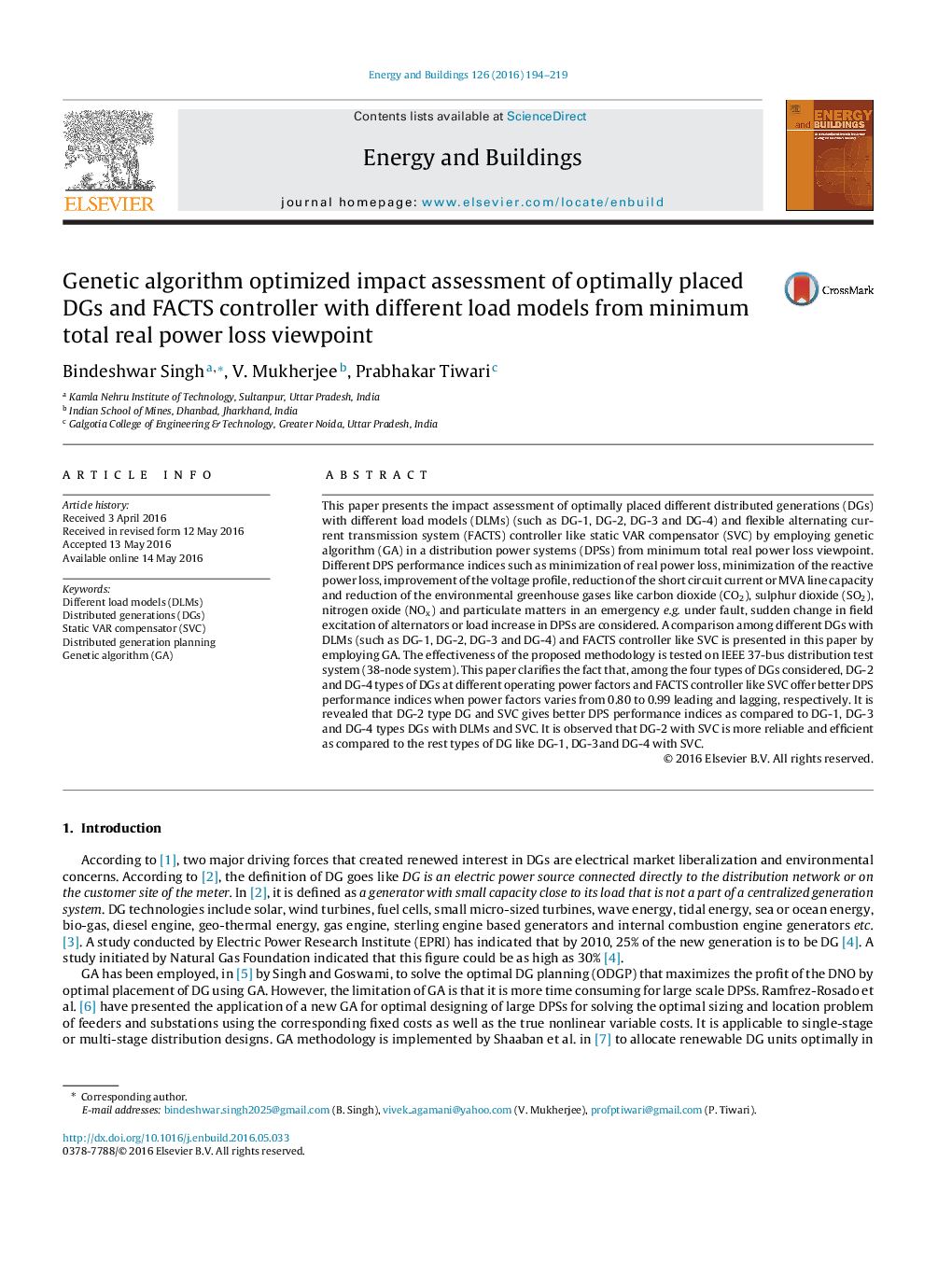| Article ID | Journal | Published Year | Pages | File Type |
|---|---|---|---|---|
| 261927 | Energy and Buildings | 2016 | 26 Pages |
•This paper considers all possible types of DGs (such as DG-1, DG-2, DG-3 and DG-4) with DLMs and FACTS controller like SVC for impact assessment of DPSs performance indices from minimum real power loss of the system viewpoint by using GA.•This paper also clarifies the fact that, among the four types of DGs considered DG-2 and DG-4 type of DGs at different operating PFs and FACTS controllers like SVC offer better DPS performance indices when PFs varies from 0.80 to 0.99 leading and lagging PFs, respectively.•This paper presents the impact assessment of optimally placed different distributed generations (DGs) with different load models (DLMs) (such as DG-1, DG-2, DG-3 and DG-4) and flexible alternating current transmission system (FACTS) controllers like static VAR compensator (SVC) by employing genetic algorithm (GA) in a distribution power systems (DPSs) from minimum total real power loss of the system viewpoint.•Different DPS performance indices such as minimization of the real power loss, minimization of the reactive power loss, improvement of the voltage profile, reduction of the short circuit current or MVA line capacity and reduction of the environmental greenhouse gases like carbon dioxide (CO2), sulphur dioxide (SO2), nitrogen oxide (NOx) and particulate matters in an emergency e.g. under fault, sudden change in field excitation of alternators or load increase in DPSs are considered.•A comparison among different DGs with DLMs (such as DG-1, DG-2, DG-3 and DG-4) and FACTS controller like SVC is presented in this paper by employing GA. The effectiveness of the proposed methodology is tested on IEEE-37 bus distribution test system.•Finally, it is concluded that DG-2 type DG and SVC gives better DPS performance indices as compared to DG-1, DG-3 and DG-4 types DGs with DLMs and SVC.•This work discusses about the important topic of integration of renewable energy sources such as DGs and FACTS controllers in the electricity grid while taking into account different DPS performance indicators.•This work is much helpful for practitioners working on the implementation of renewable (different types of DGs and FACTS controllers) and building of future electricity grids and also inclusion of the different DPS performance indicators for better social welfare, reduction in the environmental pollutants emission, improvement of the technical issues, reduction in the economical burden and improvement of the security viewpoints.
This paper presents the impact assessment of optimally placed different distributed generations (DGs) with different load models (DLMs) (such as DG-1, DG-2, DG-3 and DG-4) and flexible alternating current transmission system (FACTS) controller like static VAR compensator (SVC) by employing genetic algorithm (GA) in a distribution power systems (DPSs) from minimum total real power loss viewpoint. Different DPS performance indices such as minimization of real power loss, minimization of the reactive power loss, improvement of the voltage profile, reduction of the short circuit current or MVA line capacity and reduction of the environmental greenhouse gases like carbon dioxide (CO2), sulphur dioxide (SO2), nitrogen oxide (NOx) and particulate matters in an emergency e.g. under fault, sudden change in field excitation of alternators or load increase in DPSs are considered. A comparison among different DGs with DLMs (such as DG-1, DG-2, DG-3 and DG-4) and FACTS controller like SVC is presented in this paper by employing GA. The effectiveness of the proposed methodology is tested on IEEE 37-bus distribution test system (38-node system). This paper clarifies the fact that, among the four types of DGs considered, DG-2 and DG-4 types of DGs at different operating power factors and FACTS controller like SVC offer better DPS performance indices when power factors varies from 0.80 to 0.99 leading and lagging, respectively. It is revealed that DG-2 type DG and SVC gives better DPS performance indices as compared to DG-1, DG-3 and DG-4 types DGs with DLMs and SVC. It is observed that DG-2 with SVC is more reliable and efficient as compared to the rest types of DG like DG-1, DG-3and DG-4 with SVC.
Graphical abstractThis paper presents the impact assessment of optimally placed different distributed generations (DGs) with different load models (DLMs) (such as DG-1, DG-2, DG-3 and DG-4) and flexible alternating current transmission system (FACTS) controllers like static VAR compensator (SVC) by employing genetic algorithm (GA) in a distribution power systems (DPSs) from minimum total real power loss of the system viewpoint. Different DPS performance indices such as minimization of the real power loss, minimization of the reactive power loss, improvement of the voltage profile, reduction of the short circuit current or MVA line capacity and reduction of the environmental greenhouse gases like carbon dioxide (CO2), sulphur dioxide (SO2), nitrogen oxide (NOx) and particulate matters in an emergency e.g. under fault, sudden change in field excitation of alternators or load increase in DPSs are considered. A comparison among different DGs with DLMs (such as DG-1, DG-2, DG-3 and DG-4) and FACTS controller like SVC is presented in this paper by employing GA. The effectiveness of the proposed methodology is tested on IEEE-37 bus distribution test system.
